On The Record with USA Water Polo’s Chris Ramsey: Present, Past, Future
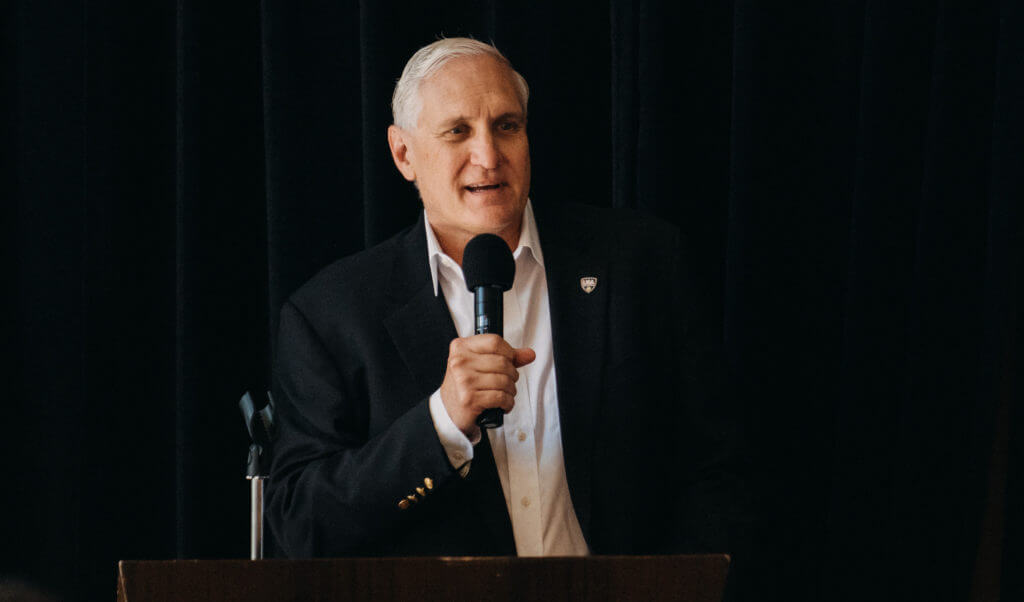
At a time when perhaps being USA Water Polo CEO is not so desirable, Christopher Ramsey plans to stay put—in spite of critics clamoring for his removal and a raging pandemic that has brought the sport to a virtual standstill.
A petition launched two weeks ago by former Olympians, past national team members and long-time age group coaches demands that Ramsey and current USAWP board chair Michael Graff step down forthwith, while also calling for the current board to resign. The cause: fallout from a series of articles by Scott M. Reid in the Orange County Register detailing multiple lawsuits against Bahram Hojreh, a one-time prominent age group polo coach in Southern California who is accused of sexual assaulting players from his International Water Polo Club’s 16U girls’ team.
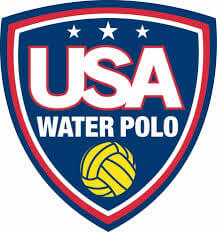 With experience as a fundraiser for the New York City Ballet and a polo background as a player for University of Redlands and age group coach in Greenwich, CT, in 2006 Ramsey vaulted to leadership of the national governing body for the sport in America. Now, allegations of personal negligence as well as his organization being named as a defendant in a civil suit filed by Manly, Stewart & Finaldi against Hojreh threaten to overshadow his stewardship of USAWP the past 14 years.
With experience as a fundraiser for the New York City Ballet and a polo background as a player for University of Redlands and age group coach in Greenwich, CT, in 2006 Ramsey vaulted to leadership of the national governing body for the sport in America. Now, allegations of personal negligence as well as his organization being named as a defendant in a civil suit filed by Manly, Stewart & Finaldi against Hojreh threaten to overshadow his stewardship of USAWP the past 14 years.
In a wide-ranging interview with Swimming World, Ramsey detailed how USAWP has doubled in size under his leadership, takes on his accusers—including long-time polo advocates who he has worked closely with during his tenure as CEO—defends himself and his organization against accusations and, despite the ravages of COVID-19, spoke optimistically of polo’s future in the U.S.
Editor’s Note: following is an edited and condensed transcript of a conversation on January 8 with Christopher Ramsey. The interview has been split into two sections; Part II will be published on January 21.
***
– 2020 was one of the most challenging years our country has ever faced. How have you and your organization respond to COVID-19’s impact, especially when it remains unknown when the virus’ threat will end?
First, we have to be compliant with all COVID-19 and health regulations. That’s important since the health and safety of our water polo athletes is our top priority. Because of the way our country is organized—there are different pandemic profiles in different states.
It’s a moving target. We went with a very aggressive austerity program, which includes salary cuts for USA Water Polo employees—15 – 25%. Making that decision early helped get us through the year.
We’ve supplied all of our clubs with “Return to Play” protocols to help them, so as things change, they’re in a position to act. One of the big impacts of the pandemic is it pushed us to accelerate our professional development programs, through the use of Zoom and Google Meet and different technological tools now available.
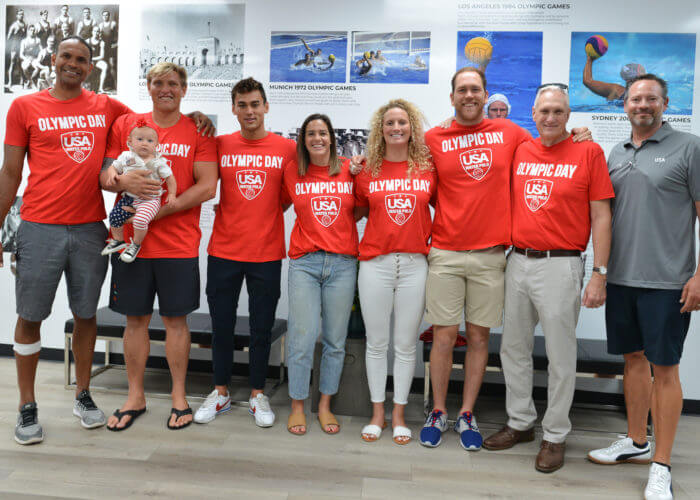
Ramsey (second from right) with national team players and and coaches. Photo Courtesy: USAWP
We were able to put together a remarkable series of professional development programs for athletes, referees and coaches. Not only did it engage a tremendous number of our members—and a lot of parents were grateful that we had programs that would connect kids to the sport—but also one of our big initiatives is the state of Texas. How are we going to get enough officials and coaches trained for the 300 – 400 new programs that are going to launch there?
At the moment, there are more schools there then there are coaches. The platforms that we’ve created for the “At Home” series are going to be tremendously helpful in expanding the sport—first in Texas, but all over the country.
[At Home With USA Water Polo: Workout With Chris Bates]
The austerity we took has enabled us to maintain financial equilibrium, and we’ll finish the year modestly in the black.
– One troubling reality is that California—the place where polo’s best athletes, referees and coaches come from—has been battered by COVID. Does USAWP need to engage in advocacy to open up polo in the state?
Where I come down on that is: we are fully behind the health and safety of our members. We’re going to follow the science, we’re going to respect the guidelines put in place by health professionals. That applies to California, too.
Are there some places you can point to where you think maybe we could be playing safely? Probably. But, as a country this is a team effort. To get a handle on this pandemic we have to respect the protocols and the health and safety rules that are being put in place by health professionals and scientists.
I don’t see it as our position to lobby the state of California. Our responsibility is to help our clubs be ready to get back when things shift. Now, with a vaccine it will shift.
And, to take advantage of places where we can play. Some California teams have gone to play in other states, where the protocols are different. There were camps in San Diego County area. So, there’s opportunism to move around where things are safe and where the health professionals say it’s okay.
[Stringham on Utah’s Salty Splash Tourney: Did it So Kids Could Play Water Polo]
But, I can’t tell you how many people and how much positive feedback we’ve gotten over focusing on professional development—I call it the intellectual side of the game—that we did by sharing knowledge through calls and online professional development modules.
I think the sport’s going to be way better for that. It’s going to pay dividends for years to come. And that will be true for California.
One other thing that’s come about because of this is the idea of nationalizing sport and bringing the water polo community closer together. How would you bump into people on the pool deck if you live in Idaho and you never get down to San Diego and bump into Doug Peabody or some of the other great coaches down there?
[Hope For a Water Polo Revival Springs Forth From Idaho]
One of the things that Zoom has done is we all can live together on a screen. I’ve been heartened by how much sharing of knowledge and strengthening our community through knowledge and resources shared with each other because of this.
– You and USAWP Board Chair Graff face detailed grievances from those who are long-time antagonists. They bring up perhaps valid criticisms but it feels as if there’s a “Hatfields vs. McCoys” feud at work that may not end until you both are out of office.
[Water Polo Olympians Start Petition Demanding Removal of USA Water Polo CEO, Board Chairman]
First of all, I will say that, what’s referenced in the petition, and the alleged abuse that is referenced seems to have a connection to the lawsuit regarding Bahram Hojreh. We take alleged abuse very seriously and we’ve invested in safeguards, policies, procedures which are audited by the U.S. Olympic Committee and Paralympic Committee, the U.S. Center for SafeSport, as well as by our board of directors and is memorialized in bylaws.
These policies and processes are very important, so I don’t in any way want to minimize the alleged abuse because we take it very seriously. The petition, we have some concerns about its validity. At least one of our staff members found out that her name was listed twice on the petition, and she never signed it. In fact, she went back to them and asked: How did this happen?
We have a board member who has a friend whose name appeared on the petition who did not authorize her name to be used and was never approached about it. We have questions about that and are going to look into it. I hope we get some answers.
Where we are in regards to the issue of allegations of us not acting is very misunderstood and frankly mischaracterized. We’re sending a letter out to our entire membership. We address more carefully some of the statements that are in the petition and in some of the Orange County Register stories that the petition grew from.
– It’s a dispute between people who have known each other a long time.
First of all, I’m no stranger to criticism, and I always try to take it constructively. We pull out the data points and examine if there are meaningful things we need to address, and so do members of our board. Things are discussed; it’s not like everyone is pretending that there aren’t critics.
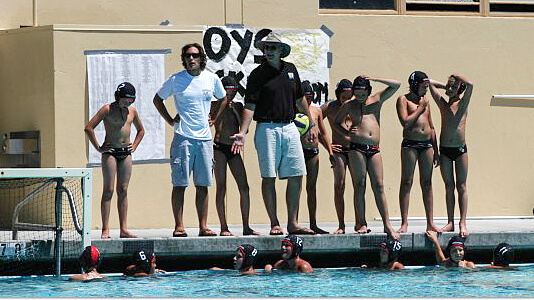
Ramsey coaching 12U athletes from Greenwich. Photo Courtesy: USAWP
I think there are some really brave people, especially from that group, that—when the U.S. Olympic Committee was ready to pull governing body status because of impending bankruptcy on the part of USA Water Polo—stepped aside from the old board and bylaw system and drafted new bylaws. This was at the beginning of ’06.
I got the volunteer coach of the year award in ’06 for coaching 12U kids in Greenwich. I went to a meeting in San Diego to get it and all these bylaw things were coming up. I was completely baffled by what was happening.
They selflessly made the decision that the organization needed to move in a new direction, from a primarily volunteer-based organization to a professional, staff-driven one with a smaller, more corporate-based board.
People like Peter Uberoff were strong voices for this type of reform throughout the Olympic movement. We were one of the first NGBs—this was before I was there, so I’m not taking credit for it—to revise their governance structure to a more corporate model, which the USOPC was advocating.
We were on the verge of bankruptcy, so we had to turn over every rock and had to be disciplined in how we spent member dollars and allocated resources, one to just stay in business but additionally to take a longer view and get some traction in improving the overall health and well-being of the sport.
That required a lot of tough decisions.
As CEO my job was to evaluate people’s performance objectively. Greg [Mescall] was one of the first people we hired 13 years ago. He is one of our success stories. Not everybody was a success story. People frankly couldn’t meet the standards that we needed them to, and we needed to make changes.
That leadership that brought in a new board for the most part brought in new faces from corporate background. People who had volunteered under very good will for a long time suddenly found themselves outside a process that to them felt like it was part of their family. So that was a very hard thing to bridge for some people.
It was hard in part because they feel so passionately about the sport. Also, it took a while to see the direction that we were going in, to understand it and see what people’s role in that direction was.
It created some real challenges, but I would also say under the old volunteer system, water polo was more tribal in those days. You had the Long Beach group, you had the Newport group, you had the Peninsula group, the Olympic Club group—you had various groups of people that were doing great things in their community for their sport. On a volunteer basis, a lot of decisions at the national office were based upon these different pockets of organization.
Our system has been: We want to grow everywhere. It’s a different approach, and maybe some gears ground as we made that transition—and in some cases maybe everyone hasn’t gotten over this.
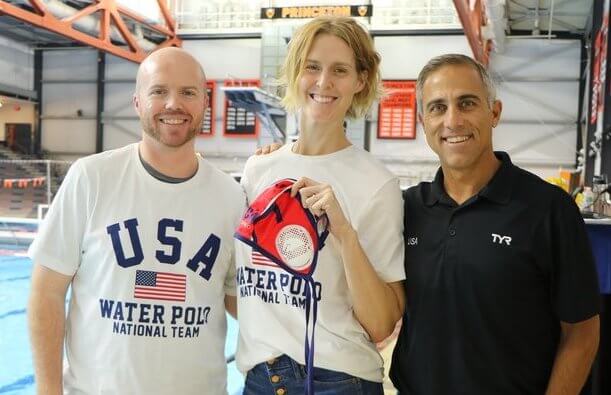
Greg Mescall, Betsey Armstrong, Adam Krikorian. Photo Courtesy: Sherie Key/USAWP
If you look at member satisfaction today—and we do a pretty rigorous member satisfaction survey as well as events—how JOs are doing, what’s the experience of people attending events, we’re pretty consistently above 95% of levels of members’ satisfaction.
Although there are people who have criticism, we also have an overwhelming number of members who are very happy with the direction USA Water Polo is going, and we have data to backs that up.
To give you another metric here, just on JOs: my first year, there were 125 – 150 teams that were participating. The year before the pandemic hit, I think we had almost 900 teams playing in JOs and another 150 or so that weren’t able to qualify.
[USA Water Polo Junior Olympics: A Regional Event Grows Into World’s Largest Polo Tournament]
The expansion of that tournament has been remarkable and it’s been one of our engines for growth.
– Part of what’s happening now is an examination of past events in your tenure through the filter of articles by Scott Reid in the Orange County Register. Is it fair to you and your organization to be scrutinized for what happened over the past 14 years?
My view is that the Hojreh litigation has raised a profile to go back and ask a lot of questions, which is sometimes what litigation does.
That said, we take everybody’s concerns seriously. Sometimes it’s frustrating to read things in the press when I know that there are clear ways issues are raised within the organization, both at the staff and board levels, to be constructively debated.
It’s not that anybody’s looking to avoid discussion of these things. We try to be transparent about these things—if you go to USA Water Polo document section, we try to put up everything and let people know what’s going on.
Beyond that, I really don’t know. Why some people have had trouble making the transition—while the vast majority of our membership has thrived with the transition—is not clear to me. I think you’re going to have to get that from them.
– Do you take it personally that some people who you’ve known for a long time and have worked with in many different capacities are now calling for your ouster?
I don’t take it personally. When you start doing that, it becomes very hard to live. I try to parse out what’s really being asked, what are the level of concern.
And that’s the frustration. I look at this organization and what it’s accomplished, helping to bring to life the Center for Safe Sport and other things, and the sport’s movement in this country, particularly in the Olympic movement as trying to get a handle on what goes beyond sport. It’s a societal challenge.
I try to pull out the substance of it and focus on that.
– Let’s talk about Bahram Hojreh, who has become a leitmotiv for current coverage of USAWP. I can’t speak to what he’s accused of, but he is someone who in some ways is embedded in both the growth, and criticism, of your organization.
Obviously at this point the courts are going to be make their own judgement. The allegations against Mr. Hojreh are terrible. I’m a parent, my kids played water polo, I was a volunteer coach. When I learned about these allegations they turned my stomach.
[SPECIAL REPORT: When Water Polo Play Becomes Sexual Abuse]
The alleged activity that’s described has absolutely no place in this sport, and that’s why we have policies and procedures in place to stop it. This is why the Center for SafeSport has been such an important new element. We were notified; someone was able to report to the Center directly. We took immediate action and suspended his membership, and he’s been suspended and now banned ever since.
That’s why those procedures are in place. Everybody has to be vigilant—the way our system works, everybody’s a reporter. All members of USA Water Polo sign codes of conduct—and part of that is an obligation to identify aberrant behavior.
Everybody has to be watchful, and it’s much easier now to click on a button and file a report with SafeSport. Actually, many of those things are working effectively.
That said, these are terrible allegations, and I believe [that] over time the truth about the allegations will come out. It’s very important that we listen to the women who have had the experience and who feel free to share honestly—and we listen to that.
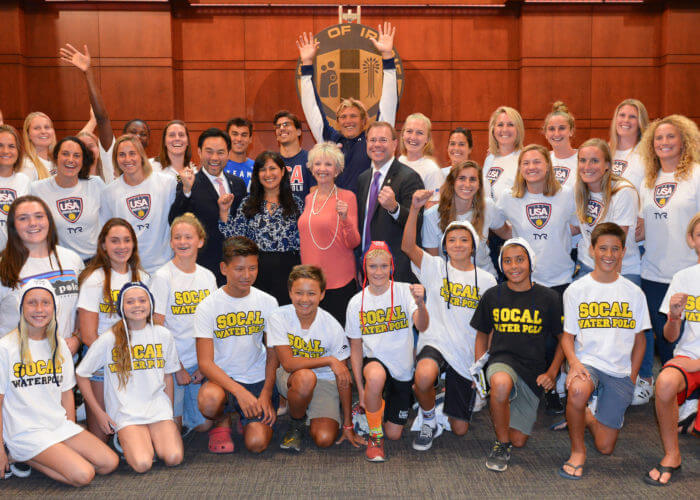
National Team players, SOCAL Water Polo members, local leaders at National Training Center’s announcement. Photo Courtesy: USAWP
But I’ll also point out Mr. Hojreh was a club coach; he was never an employee of USA Water Polo. He was a member of USA Water Polo along with 3,000+ other coaches. The firm is also suing the Anaheim School District, the Irvine School District and his club. There are a lot of strands to this that it’s going to take some time to sort it through.
Again, the allegations are sickening, so I’m eager for the process to move through so that justice may be done.
– The case that appears to have moment at this time is the civil suit by Morgan Stewart and his firm Manly, Stewart & Finaldi. What I’ve heard is that the criminal suit is not progressing. The burden of proof for a civil suit is different than for a criminal one—and typically a conviction in criminal case is the catalyst for results in a civil one.
I think we dealt with this appropriately and promptly. And I think will be shown to be the facts.
A lot of the publicity about [this case] has been disappointing mainly because there have been many incorrect facts and inaccuracies in it. That’s disappointing and frustrating to see.
Again, it’s going to be a process and it’s going to take some time but if I were an attorney I would guess that the civil suit will not be able to go forward meaningfully until the criminal case does, and the pandemic has had an impact on the courts schedules and what they’re doing. So, this will take a while to move through the judicial system.
– A point of the lawsuit and the petition is that you and your organization should have taken action against Hojreh earlier than you did.
I don’t want to get into the details of that other than to say we had no allegations of sexual abuse or misconduct from Bahram Hojreh prior to the US Center for SafeSport in January 2018 informing that he was a defendant. Two months later, the Los Alamitos Police Department arrested him. Up to that, there were no allegations.
There was grievance about getting too many red cards, there was a grievance about playing unrostered players—not about sexual abuse.
– At the same time in 2017 that some of the most serious allegations are coming to light against Mr. Hojreh, there’s this relatively new organization—the U.S. Center for SafeSport—coming on line to address the kind of abuse that he allegedly committed. How effective has the Center for SafeSport been, understanding the enormity of the Larry Nassar abuse scandal, which occurred right at the official birth of SafeSport.
The USA Gymnastics scandal is a wake-up call for everyone in the sports world. I think this is a problem that transcends sports; sadly, it’s across all aspects of society and it’s not just in the U.S.
[How was Larry Nassar able to abuse so many gymnasts for so long?]
Sadly, the first ones over the wall that try to address this are the one who end up with the toughest challenges. The Center for SafeSport is about education, reporting and remedies when things go wrong. I think that’s very important and that’s going to reduce sexual abuse in Olympic sports.
I’m proud to have voted for its creation.
It has a strong legal foundation given a mandate from Congress. It has legal immunity in its investigation of these cases. It was an initiative that was on the drawing board of the USOPC before it became independent in 2017, but it’s something that has been worked on in Olympic sports, recognizing that not all sports are expert in these matters and need resources.
As the USADA does drug compliance and doping, that model would make sense in [targeting] abuse. It’s a tremendous accomplishment that it’s up and running. I think it’s also somewhat misunderstood. When they choose to take exclusive jurisdiction over a case of abuse, they’re in. They do it, and everybody else stands aside and waits—and they have a policy of not commenting to the press—so what happens there is opaque until they come out with rulings.
Everybody’s getting used to that, but since these types of cases attract a lot of press, the Center sometimes may seem kind of invisible.
But the policies, the education and the reporting mechanisms they’re putting in place are effective and very important. One of the things that I’m really proud of for USA Water Polo is we were audited by them in 2019 and were one of the very few of only NGB to receive a 100% compliance rating from the center of that audit in our policies and procedures regarding sexual abuse.
The center is important and will make significant inroads into a scourge of our time. I hope that more people begin to fully understand its role. It’s a big investment that everyone in Olympic sport is making, and it’s hugely important for the safety of athletes and everyone in our sport.



